Unit 19: Reflective Approaches in Implementing Person Centred Practice
VerifiedAdded on 2023/01/11
|20
|5439
|75
Report
AI Summary
This report delves into the intricacies of person-centred care, examining the application of social and medical models within healthcare settings. It explores the challenges faced in implementing person-centred approaches, including difficulties in ascertaining patient wishes and navigating ethical dilemmas. The report identifies relevant legislation, such as the Health and Social Care Act and the Care Act, and discusses their impact on care provision. It also highlights the challenges encountered by healthcare professionals in adhering to these regulations, including financial constraints and political resistance. The report incorporates a reflective log, development plan, and action plan to provide a comprehensive overview of person-centred practice and its implementation within the healthcare system, ultimately aiming to improve patient care and outcomes.
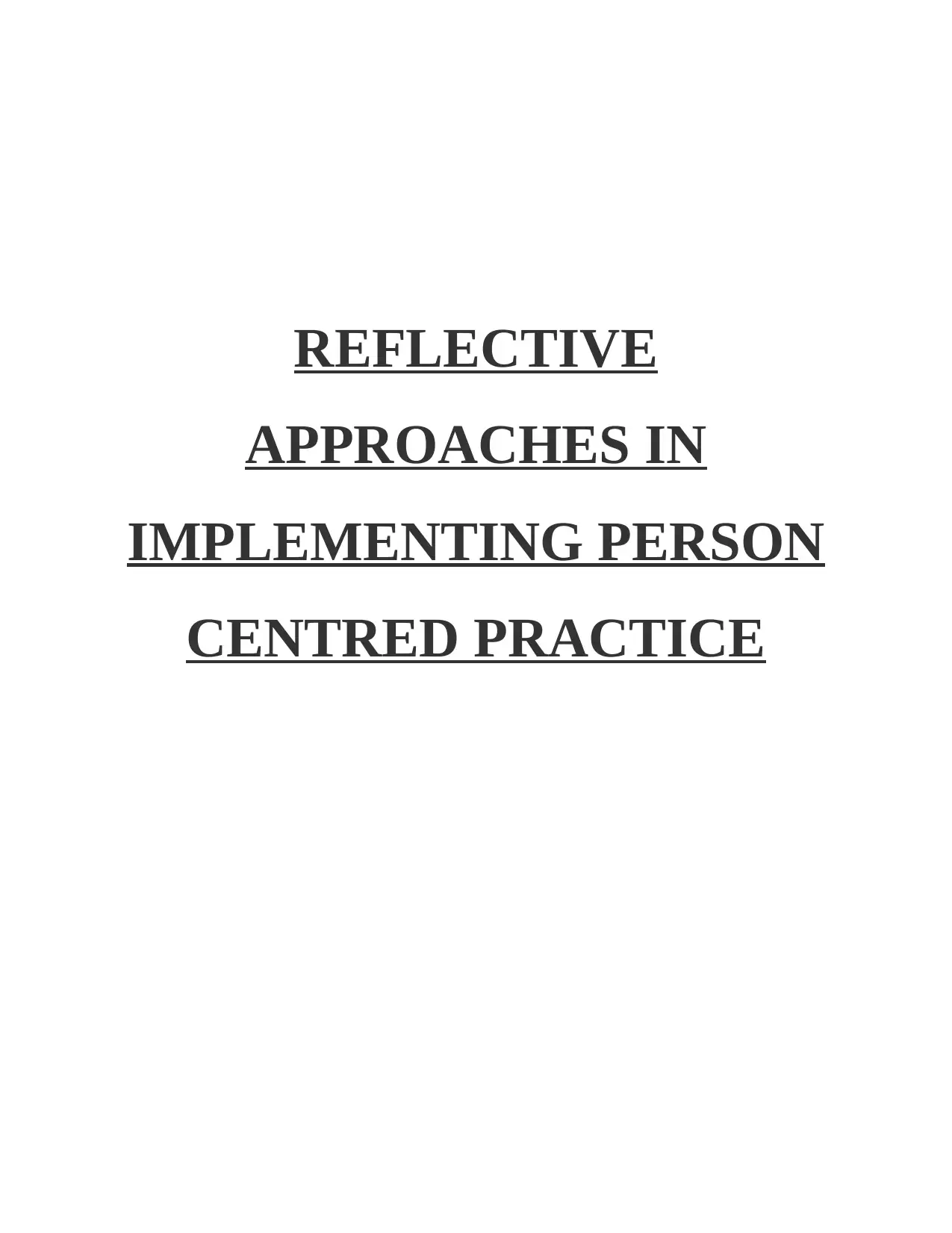
REFLECTIVE
APPROACHES IN
IMPLEMENTING PERSON
CENTRED PRACTICE
APPROACHES IN
IMPLEMENTING PERSON
CENTRED PRACTICE
Paraphrase This Document
Need a fresh take? Get an instant paraphrase of this document with our AI Paraphraser
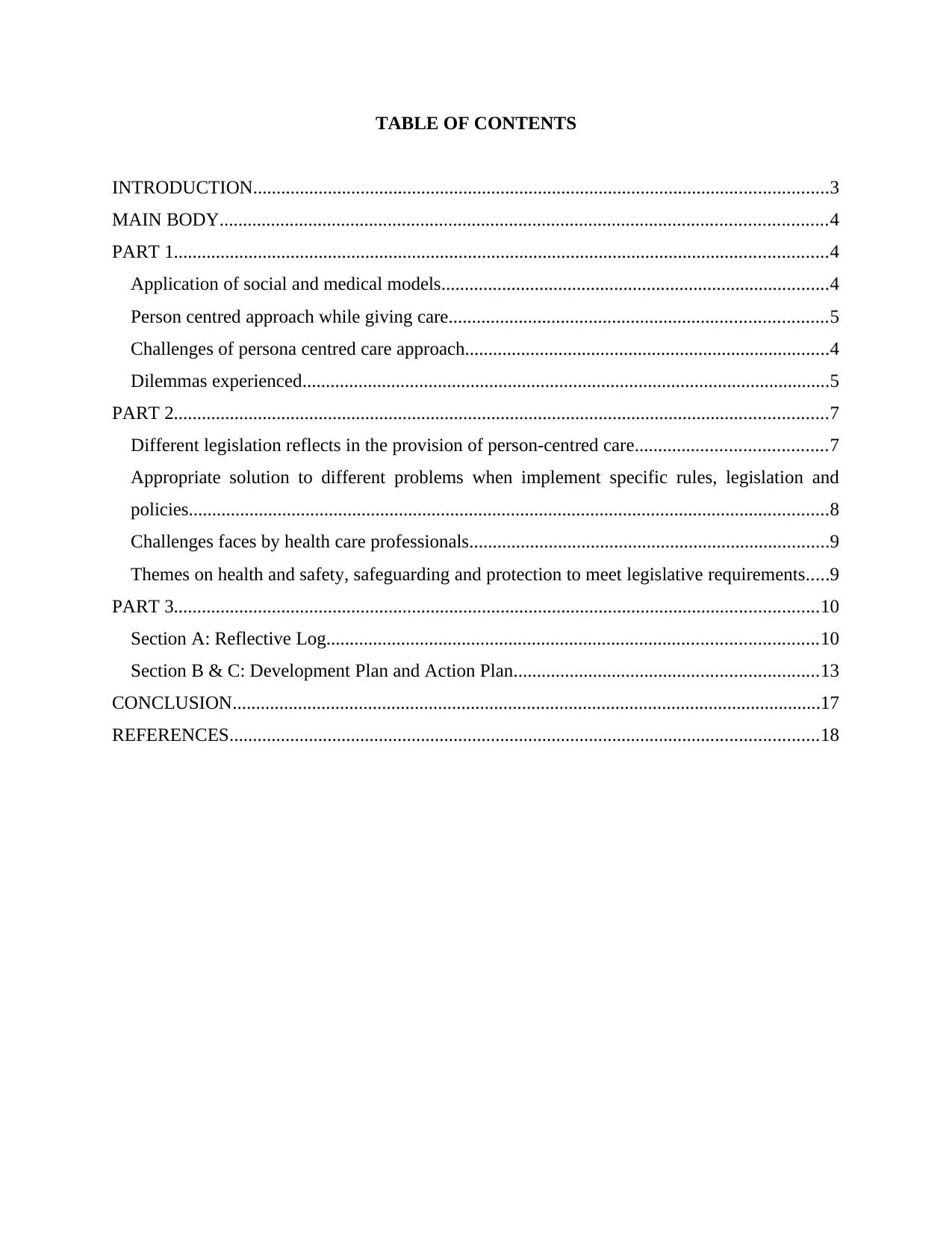
TABLE OF CONTENTS
INTRODUCTION...........................................................................................................................3
MAIN BODY..................................................................................................................................4
PART 1............................................................................................................................................4
Application of social and medical models...................................................................................4
Person centred approach while giving care.................................................................................5
Challenges of persona centred care approach..............................................................................4
Dilemmas experienced.................................................................................................................5
PART 2............................................................................................................................................7
Different legislation reflects in the provision of person-centred care.........................................7
Appropriate solution to different problems when implement specific rules, legislation and
policies.........................................................................................................................................8
Challenges faces by health care professionals.............................................................................9
Themes on health and safety, safeguarding and protection to meet legislative requirements.....9
PART 3..........................................................................................................................................10
Section A: Reflective Log.........................................................................................................10
Section B & C: Development Plan and Action Plan.................................................................13
CONCLUSION..............................................................................................................................17
REFERENCES..............................................................................................................................18
INTRODUCTION...........................................................................................................................3
MAIN BODY..................................................................................................................................4
PART 1............................................................................................................................................4
Application of social and medical models...................................................................................4
Person centred approach while giving care.................................................................................5
Challenges of persona centred care approach..............................................................................4
Dilemmas experienced.................................................................................................................5
PART 2............................................................................................................................................7
Different legislation reflects in the provision of person-centred care.........................................7
Appropriate solution to different problems when implement specific rules, legislation and
policies.........................................................................................................................................8
Challenges faces by health care professionals.............................................................................9
Themes on health and safety, safeguarding and protection to meet legislative requirements.....9
PART 3..........................................................................................................................................10
Section A: Reflective Log.........................................................................................................10
Section B & C: Development Plan and Action Plan.................................................................13
CONCLUSION..............................................................................................................................17
REFERENCES..............................................................................................................................18
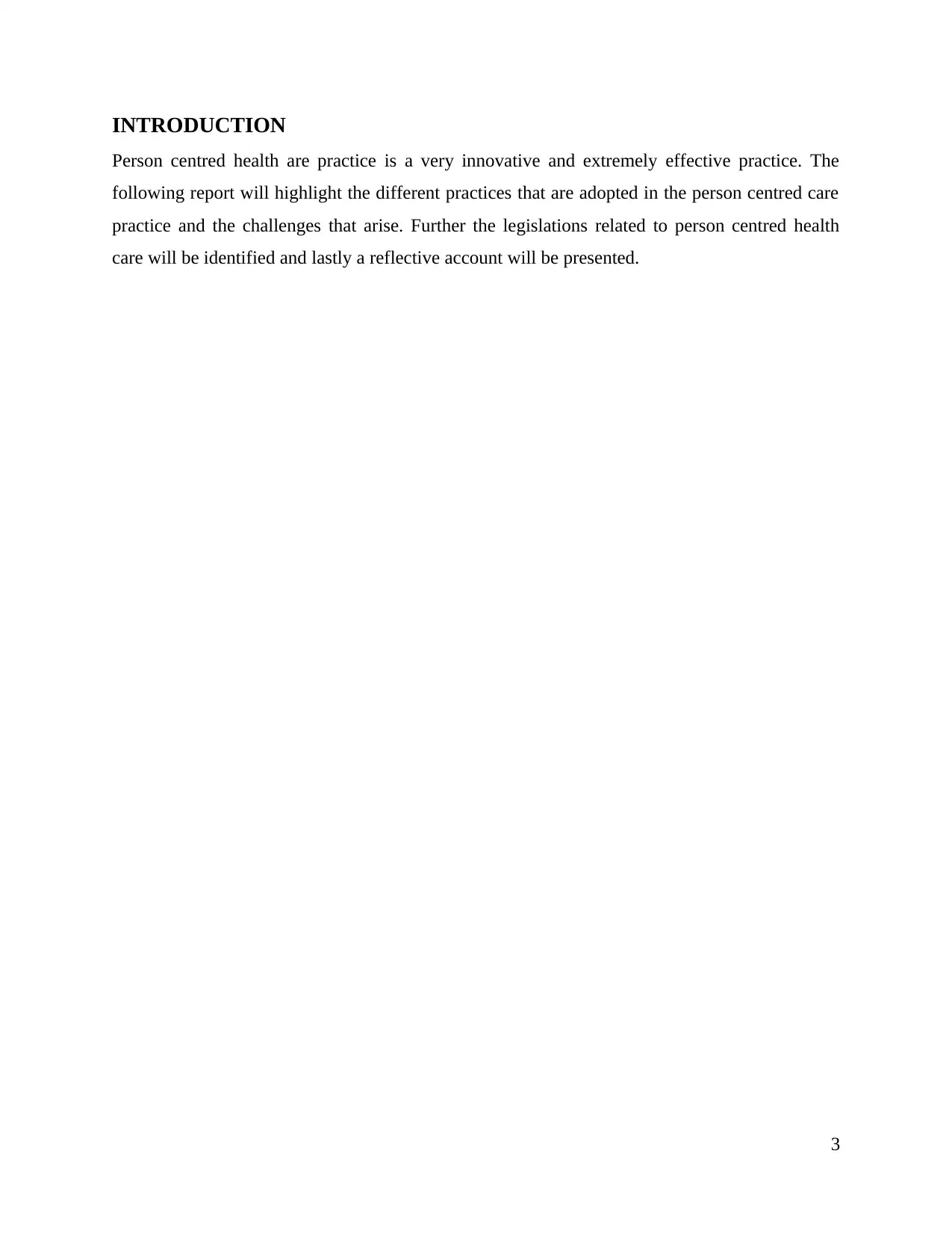
INTRODUCTION
Person centred health are practice is a very innovative and extremely effective practice. The
following report will highlight the different practices that are adopted in the person centred care
practice and the challenges that arise. Further the legislations related to person centred health
care will be identified and lastly a reflective account will be presented.
3
Person centred health are practice is a very innovative and extremely effective practice. The
following report will highlight the different practices that are adopted in the person centred care
practice and the challenges that arise. Further the legislations related to person centred health
care will be identified and lastly a reflective account will be presented.
3
⊘ This is a preview!⊘
Do you want full access?
Subscribe today to unlock all pages.

Trusted by 1+ million students worldwide

MAIN BODY
PART 1
4
PART 1
4
Paraphrase This Document
Need a fresh take? Get an instant paraphrase of this document with our AI Paraphraser
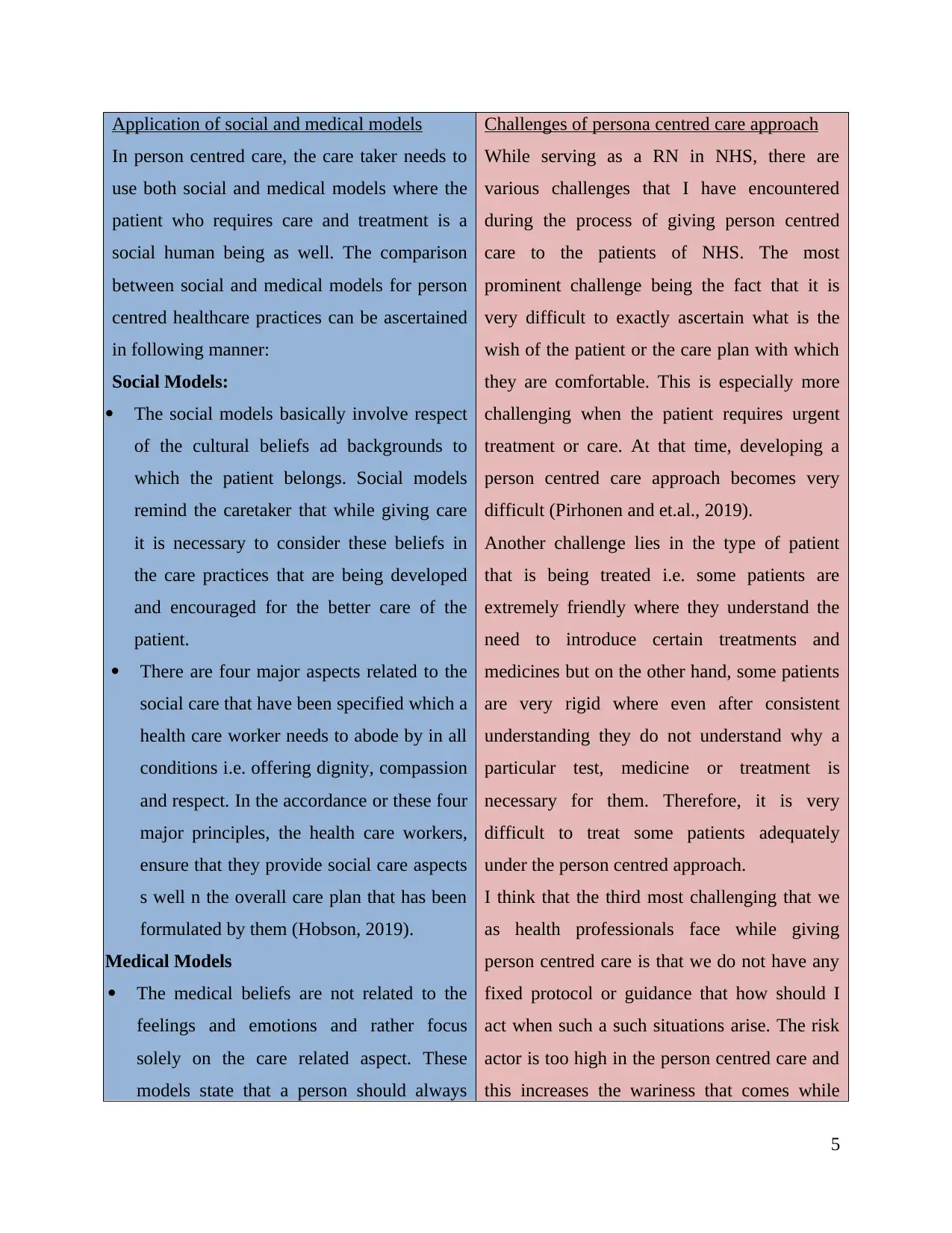
Application of social and medical models
In person centred care, the care taker needs to
use both social and medical models where the
patient who requires care and treatment is a
social human being as well. The comparison
between social and medical models for person
centred healthcare practices can be ascertained
in following manner:
Social Models:
The social models basically involve respect
of the cultural beliefs ad backgrounds to
which the patient belongs. Social models
remind the caretaker that while giving care
it is necessary to consider these beliefs in
the care practices that are being developed
and encouraged for the better care of the
patient.
There are four major aspects related to the
social care that have been specified which a
health care worker needs to abode by in all
conditions i.e. offering dignity, compassion
and respect. In the accordance or these four
major principles, the health care workers,
ensure that they provide social care aspects
s well n the overall care plan that has been
formulated by them (Hobson, 2019).
Medical Models
The medical beliefs are not related to the
feelings and emotions and rather focus
solely on the care related aspect. These
models state that a person should always
Challenges of persona centred care approach
While serving as a RN in NHS, there are
various challenges that I have encountered
during the process of giving person centred
care to the patients of NHS. The most
prominent challenge being the fact that it is
very difficult to exactly ascertain what is the
wish of the patient or the care plan with which
they are comfortable. This is especially more
challenging when the patient requires urgent
treatment or care. At that time, developing a
person centred care approach becomes very
difficult (Pirhonen and et.al., 2019).
Another challenge lies in the type of patient
that is being treated i.e. some patients are
extremely friendly where they understand the
need to introduce certain treatments and
medicines but on the other hand, some patients
are very rigid where even after consistent
understanding they do not understand why a
particular test, medicine or treatment is
necessary for them. Therefore, it is very
difficult to treat some patients adequately
under the person centred approach.
I think that the third most challenging that we
as health professionals face while giving
person centred care is that we do not have any
fixed protocol or guidance that how should I
act when such a such situations arise. The risk
actor is too high in the person centred care and
this increases the wariness that comes while
5
In person centred care, the care taker needs to
use both social and medical models where the
patient who requires care and treatment is a
social human being as well. The comparison
between social and medical models for person
centred healthcare practices can be ascertained
in following manner:
Social Models:
The social models basically involve respect
of the cultural beliefs ad backgrounds to
which the patient belongs. Social models
remind the caretaker that while giving care
it is necessary to consider these beliefs in
the care practices that are being developed
and encouraged for the better care of the
patient.
There are four major aspects related to the
social care that have been specified which a
health care worker needs to abode by in all
conditions i.e. offering dignity, compassion
and respect. In the accordance or these four
major principles, the health care workers,
ensure that they provide social care aspects
s well n the overall care plan that has been
formulated by them (Hobson, 2019).
Medical Models
The medical beliefs are not related to the
feelings and emotions and rather focus
solely on the care related aspect. These
models state that a person should always
Challenges of persona centred care approach
While serving as a RN in NHS, there are
various challenges that I have encountered
during the process of giving person centred
care to the patients of NHS. The most
prominent challenge being the fact that it is
very difficult to exactly ascertain what is the
wish of the patient or the care plan with which
they are comfortable. This is especially more
challenging when the patient requires urgent
treatment or care. At that time, developing a
person centred care approach becomes very
difficult (Pirhonen and et.al., 2019).
Another challenge lies in the type of patient
that is being treated i.e. some patients are
extremely friendly where they understand the
need to introduce certain treatments and
medicines but on the other hand, some patients
are very rigid where even after consistent
understanding they do not understand why a
particular test, medicine or treatment is
necessary for them. Therefore, it is very
difficult to treat some patients adequately
under the person centred approach.
I think that the third most challenging that we
as health professionals face while giving
person centred care is that we do not have any
fixed protocol or guidance that how should I
act when such a such situations arise. The risk
actor is too high in the person centred care and
this increases the wariness that comes while
5
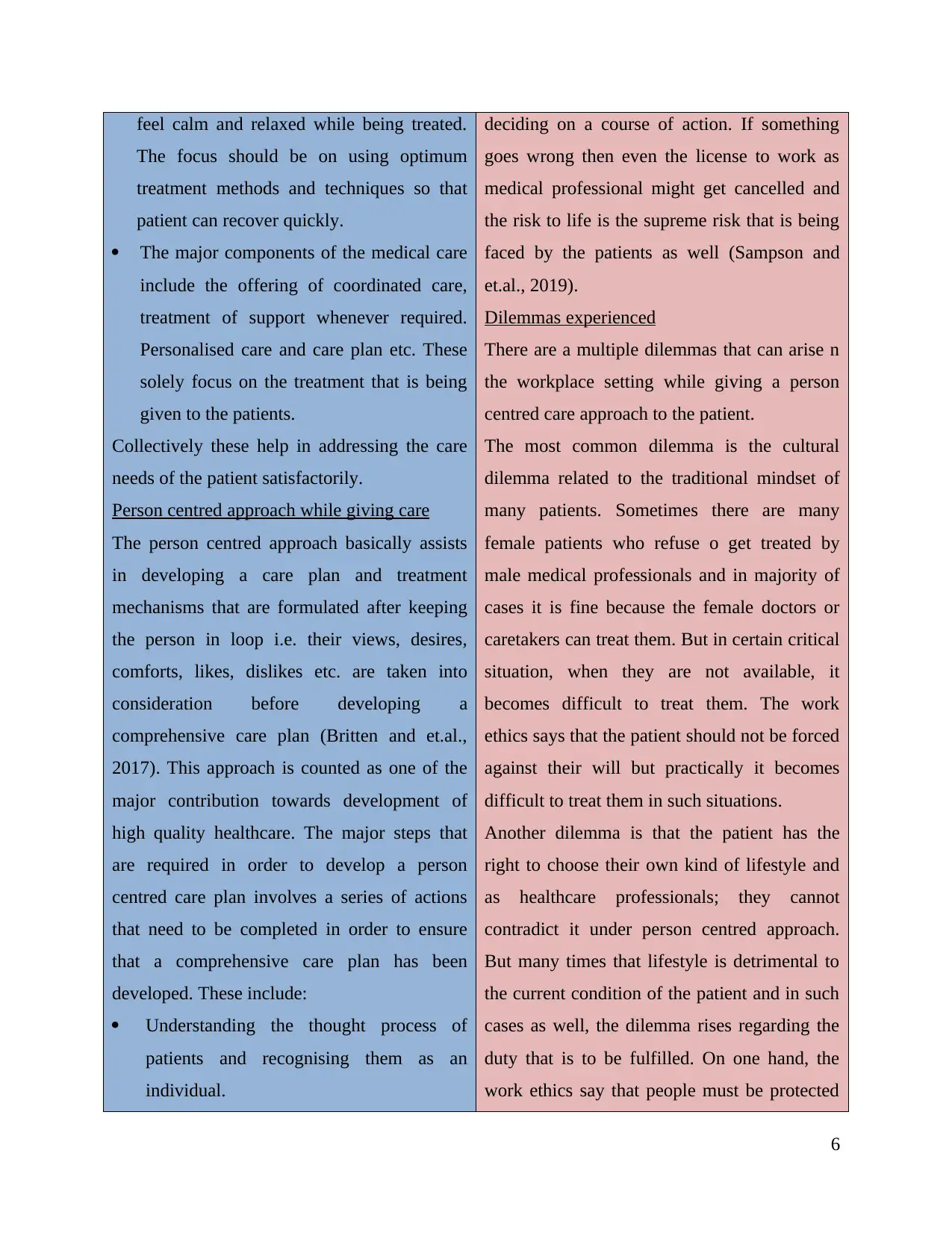
feel calm and relaxed while being treated.
The focus should be on using optimum
treatment methods and techniques so that
patient can recover quickly.
The major components of the medical care
include the offering of coordinated care,
treatment of support whenever required.
Personalised care and care plan etc. These
solely focus on the treatment that is being
given to the patients.
Collectively these help in addressing the care
needs of the patient satisfactorily.
Person centred approach while giving care
The person centred approach basically assists
in developing a care plan and treatment
mechanisms that are formulated after keeping
the person in loop i.e. their views, desires,
comforts, likes, dislikes etc. are taken into
consideration before developing a
comprehensive care plan (Britten and et.al.,
2017). This approach is counted as one of the
major contribution towards development of
high quality healthcare. The major steps that
are required in order to develop a person
centred care plan involves a series of actions
that need to be completed in order to ensure
that a comprehensive care plan has been
developed. These include:
Understanding the thought process of
patients and recognising them as an
individual.
deciding on a course of action. If something
goes wrong then even the license to work as
medical professional might get cancelled and
the risk to life is the supreme risk that is being
faced by the patients as well (Sampson and
et.al., 2019).
Dilemmas experienced
There are a multiple dilemmas that can arise n
the workplace setting while giving a person
centred care approach to the patient.
The most common dilemma is the cultural
dilemma related to the traditional mindset of
many patients. Sometimes there are many
female patients who refuse o get treated by
male medical professionals and in majority of
cases it is fine because the female doctors or
caretakers can treat them. But in certain critical
situation, when they are not available, it
becomes difficult to treat them. The work
ethics says that the patient should not be forced
against their will but practically it becomes
difficult to treat them in such situations.
Another dilemma is that the patient has the
right to choose their own kind of lifestyle and
as healthcare professionals; they cannot
contradict it under person centred approach.
But many times that lifestyle is detrimental to
the current condition of the patient and in such
cases as well, the dilemma rises regarding the
duty that is to be fulfilled. On one hand, the
work ethics say that people must be protected
6
The focus should be on using optimum
treatment methods and techniques so that
patient can recover quickly.
The major components of the medical care
include the offering of coordinated care,
treatment of support whenever required.
Personalised care and care plan etc. These
solely focus on the treatment that is being
given to the patients.
Collectively these help in addressing the care
needs of the patient satisfactorily.
Person centred approach while giving care
The person centred approach basically assists
in developing a care plan and treatment
mechanisms that are formulated after keeping
the person in loop i.e. their views, desires,
comforts, likes, dislikes etc. are taken into
consideration before developing a
comprehensive care plan (Britten and et.al.,
2017). This approach is counted as one of the
major contribution towards development of
high quality healthcare. The major steps that
are required in order to develop a person
centred care plan involves a series of actions
that need to be completed in order to ensure
that a comprehensive care plan has been
developed. These include:
Understanding the thought process of
patients and recognising them as an
individual.
deciding on a course of action. If something
goes wrong then even the license to work as
medical professional might get cancelled and
the risk to life is the supreme risk that is being
faced by the patients as well (Sampson and
et.al., 2019).
Dilemmas experienced
There are a multiple dilemmas that can arise n
the workplace setting while giving a person
centred care approach to the patient.
The most common dilemma is the cultural
dilemma related to the traditional mindset of
many patients. Sometimes there are many
female patients who refuse o get treated by
male medical professionals and in majority of
cases it is fine because the female doctors or
caretakers can treat them. But in certain critical
situation, when they are not available, it
becomes difficult to treat them. The work
ethics says that the patient should not be forced
against their will but practically it becomes
difficult to treat them in such situations.
Another dilemma is that the patient has the
right to choose their own kind of lifestyle and
as healthcare professionals; they cannot
contradict it under person centred approach.
But many times that lifestyle is detrimental to
the current condition of the patient and in such
cases as well, the dilemma rises regarding the
duty that is to be fulfilled. On one hand, the
work ethics say that people must be protected
6
⊘ This is a preview!⊘
Do you want full access?
Subscribe today to unlock all pages.

Trusted by 1+ million students worldwide
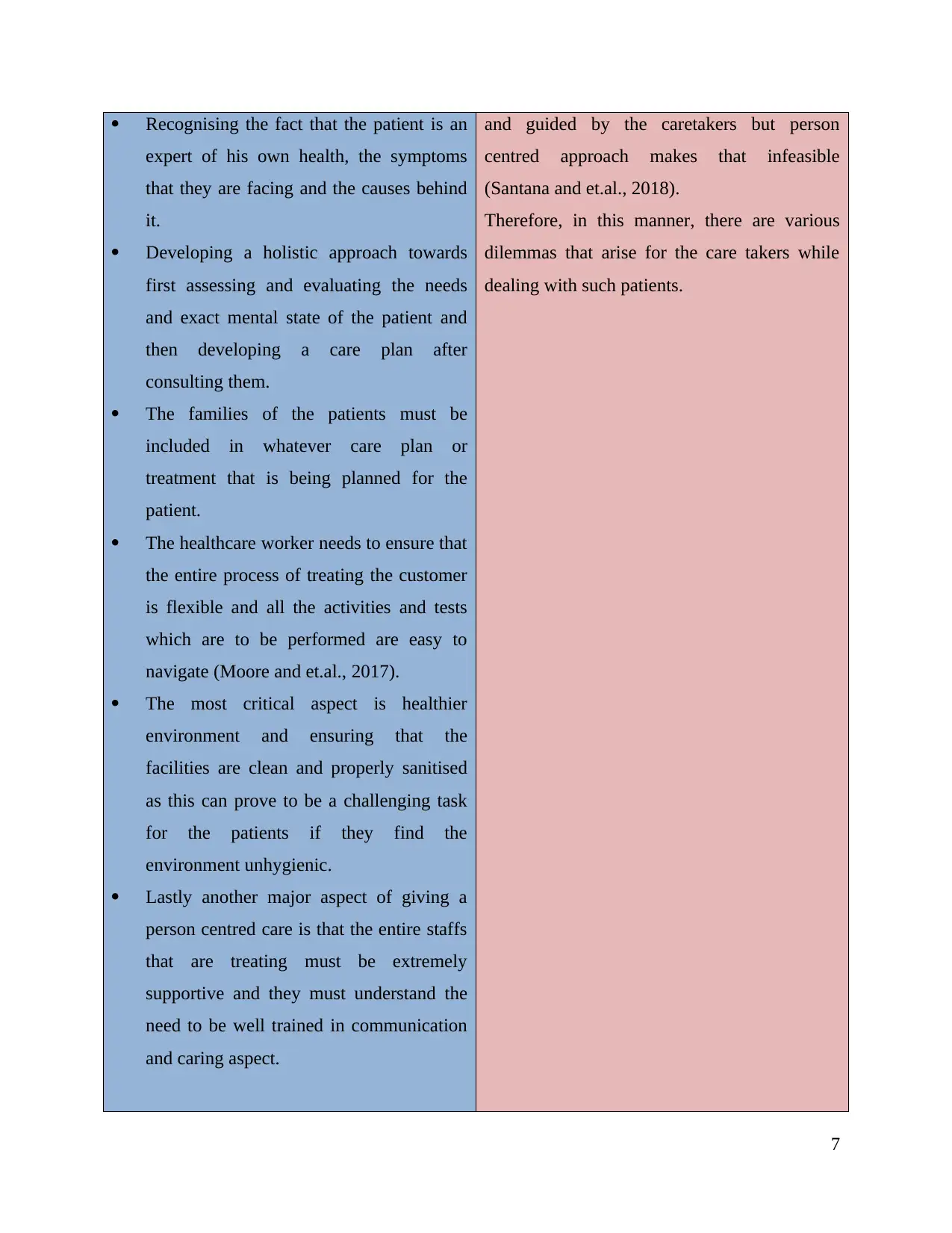
Recognising the fact that the patient is an
expert of his own health, the symptoms
that they are facing and the causes behind
it.
Developing a holistic approach towards
first assessing and evaluating the needs
and exact mental state of the patient and
then developing a care plan after
consulting them.
The families of the patients must be
included in whatever care plan or
treatment that is being planned for the
patient.
The healthcare worker needs to ensure that
the entire process of treating the customer
is flexible and all the activities and tests
which are to be performed are easy to
navigate (Moore and et.al., 2017).
The most critical aspect is healthier
environment and ensuring that the
facilities are clean and properly sanitised
as this can prove to be a challenging task
for the patients if they find the
environment unhygienic.
Lastly another major aspect of giving a
person centred care is that the entire staffs
that are treating must be extremely
supportive and they must understand the
need to be well trained in communication
and caring aspect.
and guided by the caretakers but person
centred approach makes that infeasible
(Santana and et.al., 2018).
Therefore, in this manner, there are various
dilemmas that arise for the care takers while
dealing with such patients.
7
expert of his own health, the symptoms
that they are facing and the causes behind
it.
Developing a holistic approach towards
first assessing and evaluating the needs
and exact mental state of the patient and
then developing a care plan after
consulting them.
The families of the patients must be
included in whatever care plan or
treatment that is being planned for the
patient.
The healthcare worker needs to ensure that
the entire process of treating the customer
is flexible and all the activities and tests
which are to be performed are easy to
navigate (Moore and et.al., 2017).
The most critical aspect is healthier
environment and ensuring that the
facilities are clean and properly sanitised
as this can prove to be a challenging task
for the patients if they find the
environment unhygienic.
Lastly another major aspect of giving a
person centred care is that the entire staffs
that are treating must be extremely
supportive and they must understand the
need to be well trained in communication
and caring aspect.
and guided by the caretakers but person
centred approach makes that infeasible
(Santana and et.al., 2018).
Therefore, in this manner, there are various
dilemmas that arise for the care takers while
dealing with such patients.
7
Paraphrase This Document
Need a fresh take? Get an instant paraphrase of this document with our AI Paraphraser
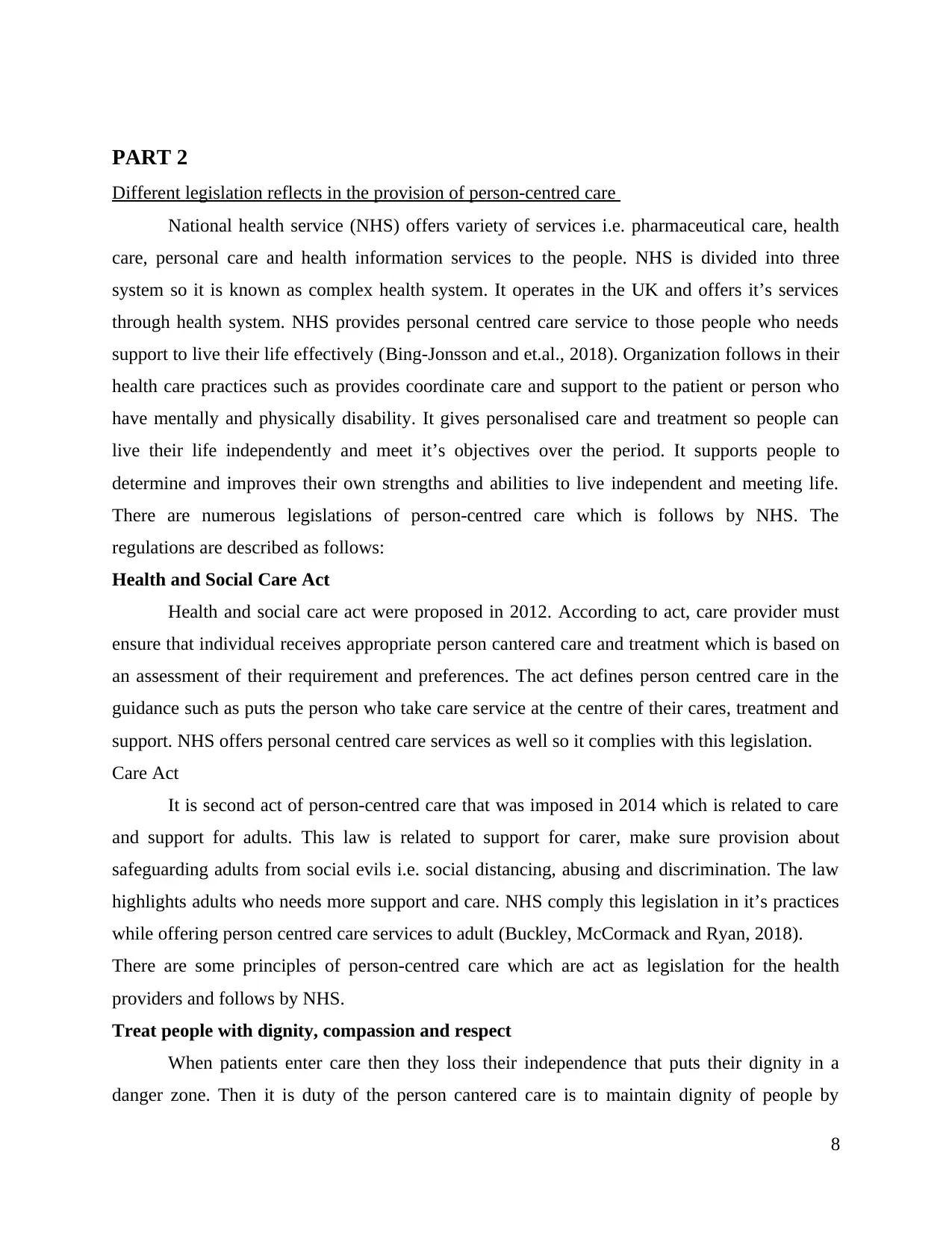
PART 2
Different legislation reflects in the provision of person-centred care
National health service (NHS) offers variety of services i.e. pharmaceutical care, health
care, personal care and health information services to the people. NHS is divided into three
system so it is known as complex health system. It operates in the UK and offers it’s services
through health system. NHS provides personal centred care service to those people who needs
support to live their life effectively (Bing-Jonsson and et.al., 2018). Organization follows in their
health care practices such as provides coordinate care and support to the patient or person who
have mentally and physically disability. It gives personalised care and treatment so people can
live their life independently and meet it’s objectives over the period. It supports people to
determine and improves their own strengths and abilities to live independent and meeting life.
There are numerous legislations of person-centred care which is follows by NHS. The
regulations are described as follows:
Health and Social Care Act
Health and social care act were proposed in 2012. According to act, care provider must
ensure that individual receives appropriate person cantered care and treatment which is based on
an assessment of their requirement and preferences. The act defines person centred care in the
guidance such as puts the person who take care service at the centre of their cares, treatment and
support. NHS offers personal centred care services as well so it complies with this legislation.
Care Act
It is second act of person-centred care that was imposed in 2014 which is related to care
and support for adults. This law is related to support for carer, make sure provision about
safeguarding adults from social evils i.e. social distancing, abusing and discrimination. The law
highlights adults who needs more support and care. NHS comply this legislation in it’s practices
while offering person centred care services to adult (Buckley, McCormack and Ryan, 2018).
There are some principles of person-centred care which are act as legislation for the health
providers and follows by NHS.
Treat people with dignity, compassion and respect
When patients enter care then they loss their independence that puts their dignity in a
danger zone. Then it is duty of the person cantered care is to maintain dignity of people by
8
Different legislation reflects in the provision of person-centred care
National health service (NHS) offers variety of services i.e. pharmaceutical care, health
care, personal care and health information services to the people. NHS is divided into three
system so it is known as complex health system. It operates in the UK and offers it’s services
through health system. NHS provides personal centred care service to those people who needs
support to live their life effectively (Bing-Jonsson and et.al., 2018). Organization follows in their
health care practices such as provides coordinate care and support to the patient or person who
have mentally and physically disability. It gives personalised care and treatment so people can
live their life independently and meet it’s objectives over the period. It supports people to
determine and improves their own strengths and abilities to live independent and meeting life.
There are numerous legislations of person-centred care which is follows by NHS. The
regulations are described as follows:
Health and Social Care Act
Health and social care act were proposed in 2012. According to act, care provider must
ensure that individual receives appropriate person cantered care and treatment which is based on
an assessment of their requirement and preferences. The act defines person centred care in the
guidance such as puts the person who take care service at the centre of their cares, treatment and
support. NHS offers personal centred care services as well so it complies with this legislation.
Care Act
It is second act of person-centred care that was imposed in 2014 which is related to care
and support for adults. This law is related to support for carer, make sure provision about
safeguarding adults from social evils i.e. social distancing, abusing and discrimination. The law
highlights adults who needs more support and care. NHS comply this legislation in it’s practices
while offering person centred care services to adult (Buckley, McCormack and Ryan, 2018).
There are some principles of person-centred care which are act as legislation for the health
providers and follows by NHS.
Treat people with dignity, compassion and respect
When patients enter care then they loss their independence that puts their dignity in a
danger zone. Then it is duty of the person cantered care is to maintain dignity of people by
8
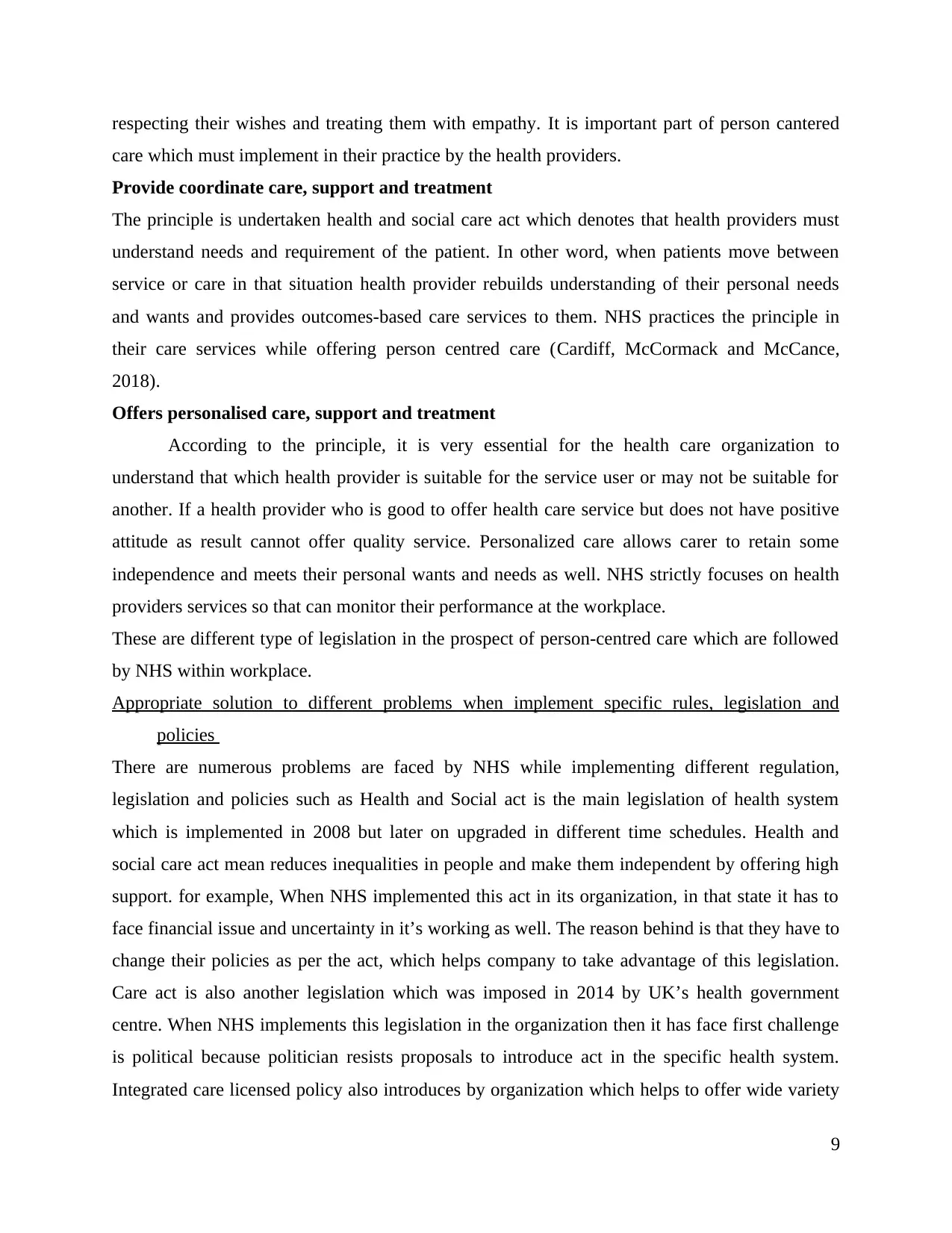
respecting their wishes and treating them with empathy. It is important part of person cantered
care which must implement in their practice by the health providers.
Provide coordinate care, support and treatment
The principle is undertaken health and social care act which denotes that health providers must
understand needs and requirement of the patient. In other word, when patients move between
service or care in that situation health provider rebuilds understanding of their personal needs
and wants and provides outcomes-based care services to them. NHS practices the principle in
their care services while offering person centred care (Cardiff, McCormack and McCance,
2018).
Offers personalised care, support and treatment
According to the principle, it is very essential for the health care organization to
understand that which health provider is suitable for the service user or may not be suitable for
another. If a health provider who is good to offer health care service but does not have positive
attitude as result cannot offer quality service. Personalized care allows carer to retain some
independence and meets their personal wants and needs as well. NHS strictly focuses on health
providers services so that can monitor their performance at the workplace.
These are different type of legislation in the prospect of person-centred care which are followed
by NHS within workplace.
Appropriate solution to different problems when implement specific rules, legislation and
policies
There are numerous problems are faced by NHS while implementing different regulation,
legislation and policies such as Health and Social act is the main legislation of health system
which is implemented in 2008 but later on upgraded in different time schedules. Health and
social care act mean reduces inequalities in people and make them independent by offering high
support. for example, When NHS implemented this act in its organization, in that state it has to
face financial issue and uncertainty in it’s working as well. The reason behind is that they have to
change their policies as per the act, which helps company to take advantage of this legislation.
Care act is also another legislation which was imposed in 2014 by UK’s health government
centre. When NHS implements this legislation in the organization then it has face first challenge
is political because politician resists proposals to introduce act in the specific health system.
Integrated care licensed policy also introduces by organization which helps to offer wide variety
9
care which must implement in their practice by the health providers.
Provide coordinate care, support and treatment
The principle is undertaken health and social care act which denotes that health providers must
understand needs and requirement of the patient. In other word, when patients move between
service or care in that situation health provider rebuilds understanding of their personal needs
and wants and provides outcomes-based care services to them. NHS practices the principle in
their care services while offering person centred care (Cardiff, McCormack and McCance,
2018).
Offers personalised care, support and treatment
According to the principle, it is very essential for the health care organization to
understand that which health provider is suitable for the service user or may not be suitable for
another. If a health provider who is good to offer health care service but does not have positive
attitude as result cannot offer quality service. Personalized care allows carer to retain some
independence and meets their personal wants and needs as well. NHS strictly focuses on health
providers services so that can monitor their performance at the workplace.
These are different type of legislation in the prospect of person-centred care which are followed
by NHS within workplace.
Appropriate solution to different problems when implement specific rules, legislation and
policies
There are numerous problems are faced by NHS while implementing different regulation,
legislation and policies such as Health and Social act is the main legislation of health system
which is implemented in 2008 but later on upgraded in different time schedules. Health and
social care act mean reduces inequalities in people and make them independent by offering high
support. for example, When NHS implemented this act in its organization, in that state it has to
face financial issue and uncertainty in it’s working as well. The reason behind is that they have to
change their policies as per the act, which helps company to take advantage of this legislation.
Care act is also another legislation which was imposed in 2014 by UK’s health government
centre. When NHS implements this legislation in the organization then it has face first challenge
is political because politician resists proposals to introduce act in the specific health system.
Integrated care licensed policy also introduces by organization which helps to offer wide variety
9
⊘ This is a preview!⊘
Do you want full access?
Subscribe today to unlock all pages.

Trusted by 1+ million students worldwide
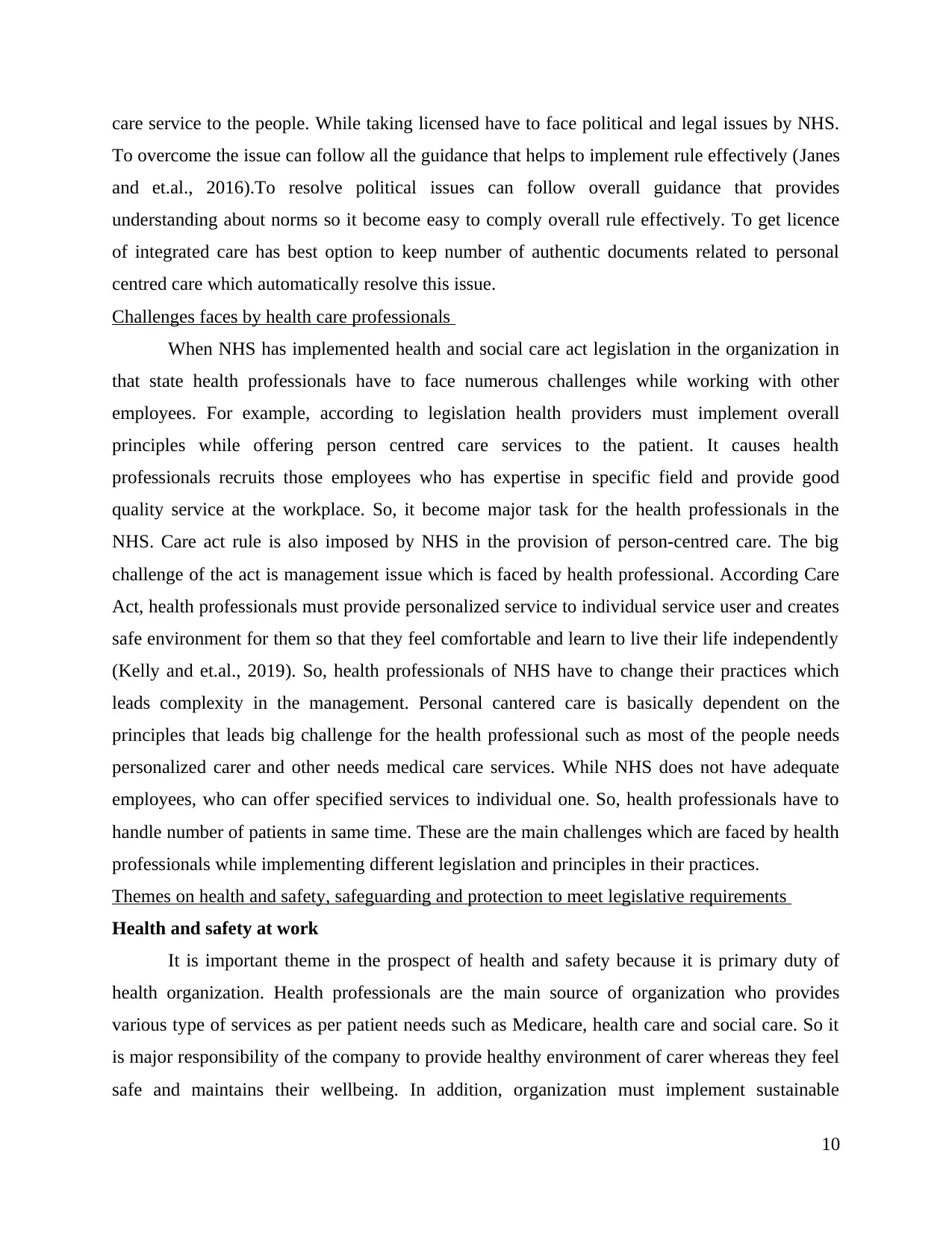
care service to the people. While taking licensed have to face political and legal issues by NHS.
To overcome the issue can follow all the guidance that helps to implement rule effectively (Janes
and et.al., 2016).To resolve political issues can follow overall guidance that provides
understanding about norms so it become easy to comply overall rule effectively. To get licence
of integrated care has best option to keep number of authentic documents related to personal
centred care which automatically resolve this issue.
Challenges faces by health care professionals
When NHS has implemented health and social care act legislation in the organization in
that state health professionals have to face numerous challenges while working with other
employees. For example, according to legislation health providers must implement overall
principles while offering person centred care services to the patient. It causes health
professionals recruits those employees who has expertise in specific field and provide good
quality service at the workplace. So, it become major task for the health professionals in the
NHS. Care act rule is also imposed by NHS in the provision of person-centred care. The big
challenge of the act is management issue which is faced by health professional. According Care
Act, health professionals must provide personalized service to individual service user and creates
safe environment for them so that they feel comfortable and learn to live their life independently
(Kelly and et.al., 2019). So, health professionals of NHS have to change their practices which
leads complexity in the management. Personal cantered care is basically dependent on the
principles that leads big challenge for the health professional such as most of the people needs
personalized carer and other needs medical care services. While NHS does not have adequate
employees, who can offer specified services to individual one. So, health professionals have to
handle number of patients in same time. These are the main challenges which are faced by health
professionals while implementing different legislation and principles in their practices.
Themes on health and safety, safeguarding and protection to meet legislative requirements
Health and safety at work
It is important theme in the prospect of health and safety because it is primary duty of
health organization. Health professionals are the main source of organization who provides
various type of services as per patient needs such as Medicare, health care and social care. So it
is major responsibility of the company to provide healthy environment of carer whereas they feel
safe and maintains their wellbeing. In addition, organization must implement sustainable
10
To overcome the issue can follow all the guidance that helps to implement rule effectively (Janes
and et.al., 2016).To resolve political issues can follow overall guidance that provides
understanding about norms so it become easy to comply overall rule effectively. To get licence
of integrated care has best option to keep number of authentic documents related to personal
centred care which automatically resolve this issue.
Challenges faces by health care professionals
When NHS has implemented health and social care act legislation in the organization in
that state health professionals have to face numerous challenges while working with other
employees. For example, according to legislation health providers must implement overall
principles while offering person centred care services to the patient. It causes health
professionals recruits those employees who has expertise in specific field and provide good
quality service at the workplace. So, it become major task for the health professionals in the
NHS. Care act rule is also imposed by NHS in the provision of person-centred care. The big
challenge of the act is management issue which is faced by health professional. According Care
Act, health professionals must provide personalized service to individual service user and creates
safe environment for them so that they feel comfortable and learn to live their life independently
(Kelly and et.al., 2019). So, health professionals of NHS have to change their practices which
leads complexity in the management. Personal cantered care is basically dependent on the
principles that leads big challenge for the health professional such as most of the people needs
personalized carer and other needs medical care services. While NHS does not have adequate
employees, who can offer specified services to individual one. So, health professionals have to
handle number of patients in same time. These are the main challenges which are faced by health
professionals while implementing different legislation and principles in their practices.
Themes on health and safety, safeguarding and protection to meet legislative requirements
Health and safety at work
It is important theme in the prospect of health and safety because it is primary duty of
health organization. Health professionals are the main source of organization who provides
various type of services as per patient needs such as Medicare, health care and social care. So it
is major responsibility of the company to provide healthy environment of carer whereas they feel
safe and maintains their wellbeing. In addition, organization must implement sustainable
10
Paraphrase This Document
Need a fresh take? Get an instant paraphrase of this document with our AI Paraphraser
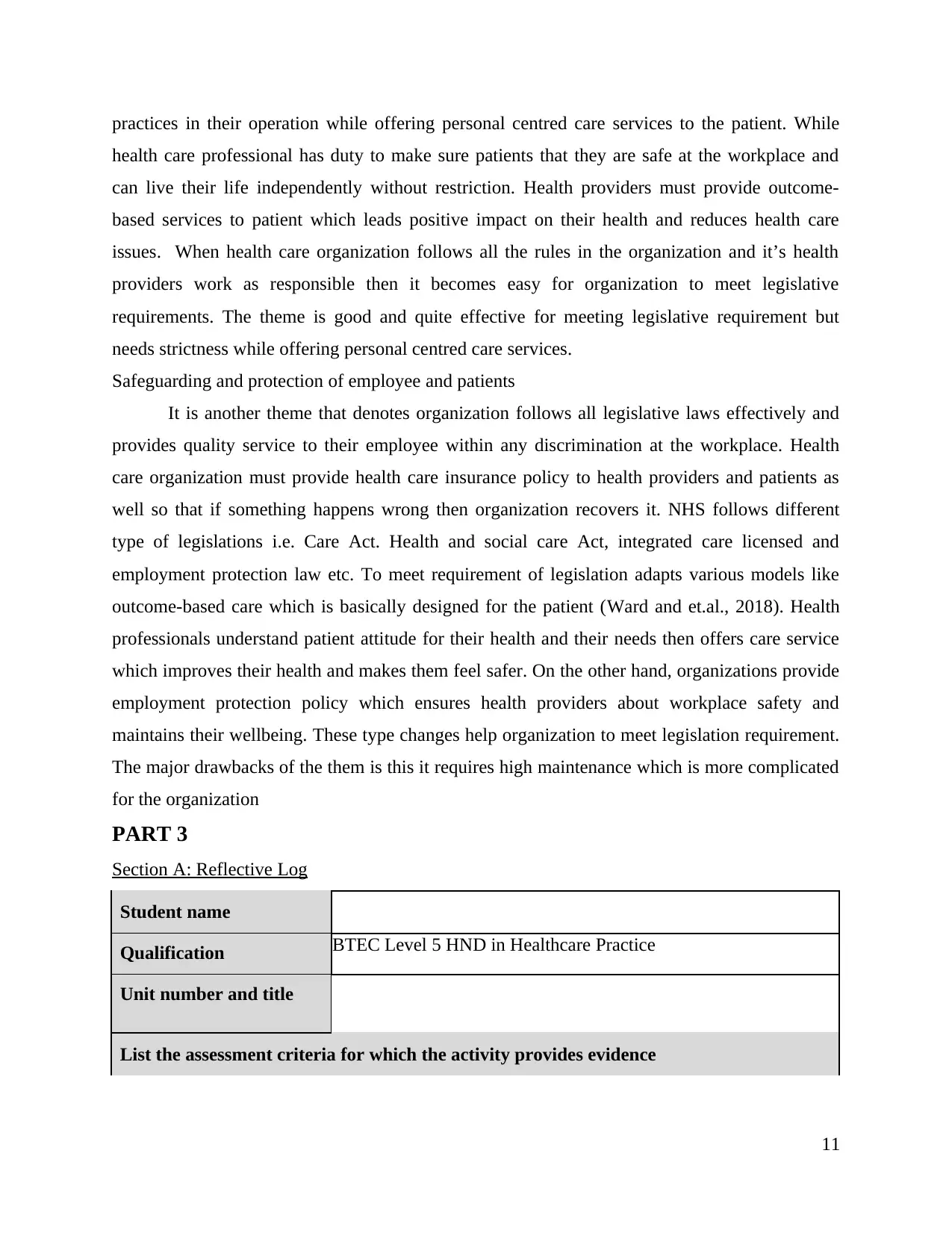
practices in their operation while offering personal centred care services to the patient. While
health care professional has duty to make sure patients that they are safe at the workplace and
can live their life independently without restriction. Health providers must provide outcome-
based services to patient which leads positive impact on their health and reduces health care
issues. When health care organization follows all the rules in the organization and it’s health
providers work as responsible then it becomes easy for organization to meet legislative
requirements. The theme is good and quite effective for meeting legislative requirement but
needs strictness while offering personal centred care services.
Safeguarding and protection of employee and patients
It is another theme that denotes organization follows all legislative laws effectively and
provides quality service to their employee within any discrimination at the workplace. Health
care organization must provide health care insurance policy to health providers and patients as
well so that if something happens wrong then organization recovers it. NHS follows different
type of legislations i.e. Care Act. Health and social care Act, integrated care licensed and
employment protection law etc. To meet requirement of legislation adapts various models like
outcome-based care which is basically designed for the patient (Ward and et.al., 2018). Health
professionals understand patient attitude for their health and their needs then offers care service
which improves their health and makes them feel safer. On the other hand, organizations provide
employment protection policy which ensures health providers about workplace safety and
maintains their wellbeing. These type changes help organization to meet legislation requirement.
The major drawbacks of the them is this it requires high maintenance which is more complicated
for the organization
PART 3
Section A: Reflective Log
Student name
Qualification BTEC Level 5 HND in Healthcare Practice
Unit number and title
List the assessment criteria for which the activity provides evidence
11
health care professional has duty to make sure patients that they are safe at the workplace and
can live their life independently without restriction. Health providers must provide outcome-
based services to patient which leads positive impact on their health and reduces health care
issues. When health care organization follows all the rules in the organization and it’s health
providers work as responsible then it becomes easy for organization to meet legislative
requirements. The theme is good and quite effective for meeting legislative requirement but
needs strictness while offering personal centred care services.
Safeguarding and protection of employee and patients
It is another theme that denotes organization follows all legislative laws effectively and
provides quality service to their employee within any discrimination at the workplace. Health
care organization must provide health care insurance policy to health providers and patients as
well so that if something happens wrong then organization recovers it. NHS follows different
type of legislations i.e. Care Act. Health and social care Act, integrated care licensed and
employment protection law etc. To meet requirement of legislation adapts various models like
outcome-based care which is basically designed for the patient (Ward and et.al., 2018). Health
professionals understand patient attitude for their health and their needs then offers care service
which improves their health and makes them feel safer. On the other hand, organizations provide
employment protection policy which ensures health providers about workplace safety and
maintains their wellbeing. These type changes help organization to meet legislation requirement.
The major drawbacks of the them is this it requires high maintenance which is more complicated
for the organization
PART 3
Section A: Reflective Log
Student name
Qualification BTEC Level 5 HND in Healthcare Practice
Unit number and title
List the assessment criteria for which the activity provides evidence
11
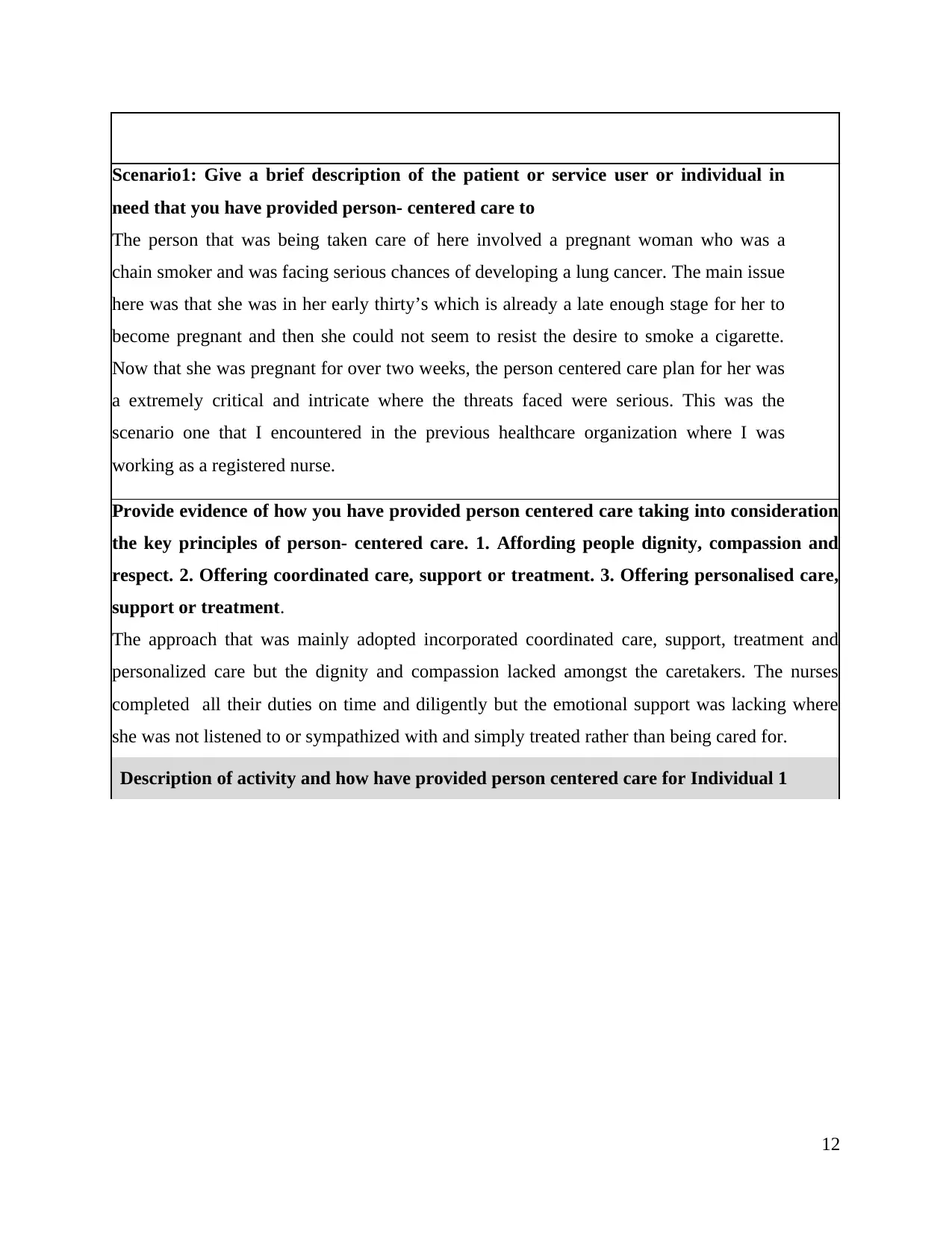
Scenario1: Give a brief description of the patient or service user or individual in
need that you have provided person- centered care to
The person that was being taken care of here involved a pregnant woman who was a
chain smoker and was facing serious chances of developing a lung cancer. The main issue
here was that she was in her early thirty’s which is already a late enough stage for her to
become pregnant and then she could not seem to resist the desire to smoke a cigarette.
Now that she was pregnant for over two weeks, the person centered care plan for her was
a extremely critical and intricate where the threats faced were serious. This was the
scenario one that I encountered in the previous healthcare organization where I was
working as a registered nurse.
Provide evidence of how you have provided person centered care taking into consideration
the key principles of person- centered care. 1. Affording people dignity, compassion and
respect. 2. Offering coordinated care, support or treatment. 3. Offering personalised care,
support or treatment.
The approach that was mainly adopted incorporated coordinated care, support, treatment and
personalized care but the dignity and compassion lacked amongst the caretakers. The nurses
completed all their duties on time and diligently but the emotional support was lacking where
she was not listened to or sympathized with and simply treated rather than being cared for.
Description of activity and how have provided person centered care for Individual 1
12
need that you have provided person- centered care to
The person that was being taken care of here involved a pregnant woman who was a
chain smoker and was facing serious chances of developing a lung cancer. The main issue
here was that she was in her early thirty’s which is already a late enough stage for her to
become pregnant and then she could not seem to resist the desire to smoke a cigarette.
Now that she was pregnant for over two weeks, the person centered care plan for her was
a extremely critical and intricate where the threats faced were serious. This was the
scenario one that I encountered in the previous healthcare organization where I was
working as a registered nurse.
Provide evidence of how you have provided person centered care taking into consideration
the key principles of person- centered care. 1. Affording people dignity, compassion and
respect. 2. Offering coordinated care, support or treatment. 3. Offering personalised care,
support or treatment.
The approach that was mainly adopted incorporated coordinated care, support, treatment and
personalized care but the dignity and compassion lacked amongst the caretakers. The nurses
completed all their duties on time and diligently but the emotional support was lacking where
she was not listened to or sympathized with and simply treated rather than being cared for.
Description of activity and how have provided person centered care for Individual 1
12
⊘ This is a preview!⊘
Do you want full access?
Subscribe today to unlock all pages.

Trusted by 1+ million students worldwide
1 out of 20
Related Documents
Your All-in-One AI-Powered Toolkit for Academic Success.
+13062052269
info@desklib.com
Available 24*7 on WhatsApp / Email
![[object Object]](/_next/static/media/star-bottom.7253800d.svg)
Unlock your academic potential
Copyright © 2020–2026 A2Z Services. All Rights Reserved. Developed and managed by ZUCOL.





